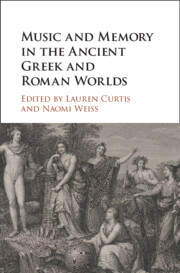Book contents
- Music and Memory in the Ancient Greek and Roman Worlds
- Music and Memory in the Ancient Greek and Roman Worlds
- Copyright page
- Contents
- Figures
- Contributors
- Acknowledgments
- Note on Texts and Abbreviations
- Part I Approaching Music and Memory
- Part II Music, Body, and Textual Archives
- Part III Technologies of Musical Memory
- Part IV Audience, Music, and Repertoire
- Chapter 7 Iacchus Resonatus
- Chapter 8 Performance, Memory, and Affect
- Chapter 9 Meter, Music, and Memory in Roman Comedy
- Part V Music and Memorialization
- Bibliography
- General Index
- Index Locorum
Chapter 9 - Meter, Music, and Memory in Roman Comedy
from Part IV - Audience, Music, and Repertoire
Published online by Cambridge University Press: 14 October 2021
- Music and Memory in the Ancient Greek and Roman Worlds
- Music and Memory in the Ancient Greek and Roman Worlds
- Copyright page
- Contents
- Figures
- Contributors
- Acknowledgments
- Note on Texts and Abbreviations
- Part I Approaching Music and Memory
- Part II Music, Body, and Textual Archives
- Part III Technologies of Musical Memory
- Part IV Audience, Music, and Repertoire
- Chapter 7 Iacchus Resonatus
- Chapter 8 Performance, Memory, and Affect
- Chapter 9 Meter, Music, and Memory in Roman Comedy
- Part V Music and Memorialization
- Bibliography
- General Index
- Index Locorum
Summary
Metrical patterns reveal that in Roman Comedy music and memory worked closely together. Roman audiences had distinct and clear memories of music they had heard in the theater. Plautus and Terence, in patterning the music of their plays, relied on spectators’ memory of earlier music in the play they were watching, musical conventions of the genre, and specific musical moments in earlier plays, and they employed music in ways reminiscent of the reprises and other techniques of musical repetition in American Musical Theater. The importance of musical memory is particularly evident in Plautus’ Amphitruo, where metrical repetition reveals four different musical motifs, surrounding, respectively, the play’s iambic senarii, trochaic septenarii, iambic octonarii, and bacchiacs. Each motif works because spectators would remember music from plays they had seen before and from previous scenes in Amphitruo itself. In each case Plautus’ play with musical memories contributes to the generic uncertainty surrounding this unique tragicomoedia, helping to make clear that in fact Amphitruo transcends all the generic categories with which its audience would be familiar.
Keywords
- Type
- Chapter
- Information
- Music and Memory in the Ancient Greek and Roman Worlds , pp. 234 - 258Publisher: Cambridge University PressPrint publication year: 2021

